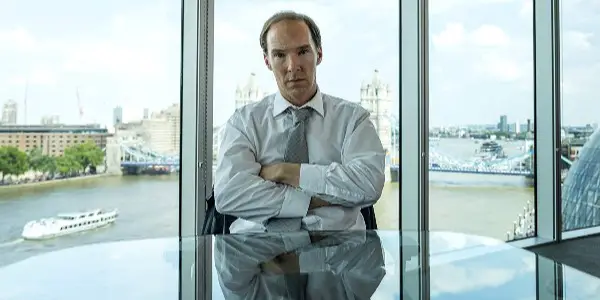BREXIT: THE UNCIVIL WAR: Unfocused Depiction Of The Campaign That Divided Britain

Alistair is a 25 year old writer based in Cambridge.…
Britain’s vote to leave the European Union was one of the most seismic political shocks in recent memory. Whichever way your vote fell, there was no doubting that this was a truly significant moment – and the closest Britain’s first past the post electoral system will get to a populist election victory in the vein of Trump. Britain is scheduled to leave the EU on March 29th, but there is no sign that it will stop dominating the headlines from there; for almost three years, it has dominated the national debate like nothing before.
Or, at least, that’s what the media has been banking on for the past few years – yes, the consequences of leaving the EU are drastic, and the only exit deal prime minister Theresa May could get from the Union has only united the country in their opposition to it. 700,000 people marched in favour of remaining in the EU in the largest British protests since the “Stop the War” marches in 2003, while on the other end of the spectrum, a newly emboldened far right movement has taken to the streets to demand a “no deal Brexit” at all costs. It’s a turbulent time in Britain.
And yet despite the grave consequences, a significant majority are absolutely bored of hearing about Brexit, and after being such an integral part of the political conversation for so long, the only people who will be surprised by the direction of current events are those who have been in a coma since June 23rd, 2016. The country is sleepwalking to disaster due to the populace’s complete and utter boredom.
Derailed by Brexit Fatigue
Into this arena steps Brexit: The Uncivil War, HBO’s big budget dramatisation of the inner workings of the leave campaign. Co-produced with British broadcaster Channel 4, the film attempts to not take sides on the still divisive issue – and as a result, ends up treading water as it merely rehashes the same information that has dominated headlines for the last few years, that British audiences are now fed up of hearing. It holds nothing of interest to either side of the debate, pitching itself squarely at international viewers curious as to how a country so stereotypically defined by a stiff upper lip broke the political status quo.
Benedict Cumberbatch stars as Dominic Cummings, who is reluctantly hired by a blossoming “vote leave” campaign despite vowing never to return to Westminster. Intent to win at all costs, he makes the bold decision to circumnavigate traditional campaigning techniques to instead focus on micro-targeting tools that could feed the data of millions of social media accounts to their database, and specifically target a variety of tailor-made campaigns to each individual. Elsewhere, the remain campaign led by Craig Oliver (Rory Kinnear) is using more traditional methods of attracting voters – but has an uphill struggle against a rising populist anger their messaging is struggling to silence.

The film uses the bizarre framing of Dominic Cummings being questioned about the shady methods who used to get an electoral victory in 2016 four years after the vote – a bizarre flash-forward to a future that automatically assumes Brexit will have taken place in disastrous fashion, despite the claim it hasn’t taken sides. This is the closest the film gets to possessing a political bite, and even this feels clumsy when centered in a film that tries its best to articulate the frustrations of politicians and voters on both sides of the argument.
I kept thinking of Adam McKay‘s flawed but fascinating Vice throughout. Of course, in the current political moment, no British broadcaster could take an unambiguous side in the argument – but that deprives the material of having any significant point outside of dramatising headlines the national audience is already too familiar with to be interested by. Vice is an unashamedly anti-Republican movie, with pantomime performances, bizarre editing techniques and an absurdist sense of humour. It’s a messy, ambitious film that I appreciate the ambition of even if I don’t fully connect with the end result.
But there’s no doubt that it’s saying SOMETHING, even if that message is increasingly obvious in an era when hostility to Trump’s presidency is the default, least controversial political position conceivable. Brexit doesn’t have a similar anger, nor does it possess anything that can make audience members see the debate through a fresh pair of eyes. The US title for the film is simply “Brexit”, and that’s exactly what it is – a dramatisation of the campaign, nothing more, nothing less.
One particular recurring sequence in Vice has a parallel in Brexit, and that’s the use of focus groups as a shorthand to easily summarise the national mood as the divisive campaign progresses. The difference is here this isn’t some lazy shortcut to a gag, but rather a devastating way of showing how far right talking points slowly manifested themselves in everyday conversation, transforming a debate about being part of a trading bloc into one entirely built around the issue of immigration. Again, this isn’t a particularly revelatory moment for the viewer, but within the drama it offers a human angle to a film so calculated in its desire to show the inner workings of the two campaigns.

We get told a lot about how the Leave campaign has toxified national debate via their manipulation of the social media profiles of millions of Britons, but this is the only time we are shown the direct impact this has had. The story of how Leave broke electoral rules to claim victory is oft-repeated and offers nothing in the way of surprises here – but the changing effects their manipulation of debate had on everyday people has had more devastating, and long lasting, consequences that I wished the film did more than scratch the surface of. The film may articulate the context the vote was held in, but it does very little to show how it has effected the country.
Lacks a clarity of focus
Although the performances are largely fun, they never rise above caricature; there’s a joy akin to pantomime at seeing broadly comedic impressions of the likes of Boris Johnson and Nigel Farage (played by Richard Goulding and Paul Ryan, respectively) as two different kinds of bumbling idiots. But they feel at odds with the sobering tone established elsewhere, included as they are vital parts of the Brexit narrative at large, even though their personalities (and the representations of those personalities) fit awkwardly with the material. They could have easily been removed to focus on the behind the scenes intrigue – at times, it just feels like boxes are being ticked to cover as much of the turbulent campaign as possible.
Although tangential to the story, we even get one detour where Robert Mercer introduces Brexit megadonor Arron Banks (Lee Boardman) to his friend “Steve… Steve Bannon”, a moment that ties it to other turbulent political events of 2016 yet feels besides the point when included here. Despite maintaining an irritating impartiality, the film tries to portray as many damning moments related to the referendum as possible, even though solely focusing on the campaigning strategies of Dominic Cummings would have an identical effect.

Benedict Cumberbatch’s lead performance plays safely within his wheelhouse. We’re told Dominic Cummings’ doesn’t have much in the way of a recognisable public persona, but the actor makes him into an instantly recognisable caricature by the characterisation of Cummings as a socially awkward genius – the persona Cumberbatch has found himself typecast in. This is to be expected (no talented actor has squandered their talent on diminishing iterations of past glories as quickly as Cumberbatch), but it’s especially frustrating considering that this characterisation of Cummings has an unexplored depth.
There’s no suggestion he’s on the side of Brexit, depicted as far more interested in obtaining an against all odds victory to win a political game stacked against him. This aspect of his persona is instead discussed by various secondary characters, but never factors directly into his character arc; interesting ideas are paid lip service to throughout, in the hopes that this will compensate for not properly integrating them into a sprawling, messy drama that refuses to offer any new angle on the whole Brexit debacle.
It’s a particular shame considering the credentials of screenwriter James Graham, whose plays dissecting pivotal moments in British politics have brought him international acclaim. But works such as This House, documenting the parliamentary struggles of the mid seventies, culminating in Margaret Thatcher’s 1979 election, are more sprawling in the eras they depict – but by focusing solely on those behind the scenes, they have a clarity of focus which eludes Brexit.
Brexit: The Uncivil War: Conclusion
Brexit: The Uncivil War tells you nothing you couldn’t already ascertain from a cursory glance at the headlines over the past few years. International viewers may be enthralled at witnessing Britain’s spiral into madness dramatised in this manner, but for those who have had to live with this political reality since 2016, this film feels like old news. It’s not quite Brex-Shit, but it’s close.
Brexit: The Uncivil War aired in the UK on January 7, and in the US on January 20.
https://www.youtube.com/watch?v=3U9PtoH5bsM
Does content like this matter to you?
Become a Member and support film journalism. Unlock access to all of Film Inquiry`s great articles. Join a community of like-minded readers who are passionate about cinema - get access to our private members Network, give back to independent filmmakers, and more.
Alistair is a 25 year old writer based in Cambridge. He has been writing about film since the start of 2014, and in addition to Film Inquiry, regularly contributes to Gay Essential and The Digital Fix, with additional bylines in Film Stories, the BFI and Vague Visages. Because of his work for Film Inquiry, he is a recognised member of GALECA, the Gay & Lesbian Entertainment Critics' Association.













